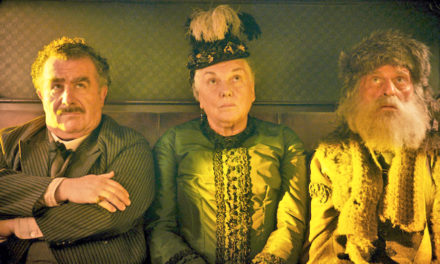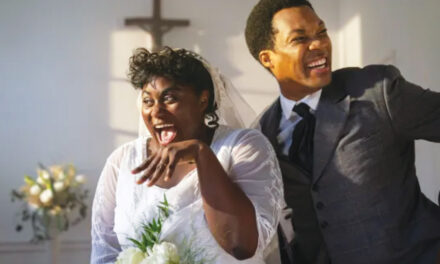
The Front Runner • Roma
The Front Runner (** ½)
When measured against the modern political arena in which we now currently reside, the saga of the disgraced presidential hopeful of the 1988 election, Gary Hart, seems like small potatoes by comparison to today’s headlines. At any rate, that was my big takeaway from acclaimed filmmaker Jason Reitman’s new film, The Front Runner, regardless of whether or not that is the intention of Reitman and his cinematic co-conspirators. Hart was a candidate with great promise and progressive ideas whose entire political campaign was derailed by his ill-advised decision to consort with campaign volunteer and former model, Donna Rice.
Perhaps the point Reitman and company are trying to make with this docudrama, if for no other reason, is to illustrate just how far we’ve come in the last thirty years and not necessarily in a good way.
Yalitza Aparicio in Roma
Hugh Jackman is believable enough as Gary Hart, even if the hairpiece he wears is never quite as convincing as you might expect or want and his American accent wavers from time to time. In his personal life, he’s portrayed early in the film as a pretty devoted family man whose long time marriage to his wife, Lee (Vera Farmiga) seems to be on solid ground. In his professional life, the Colorado Senator has big plans that he expects he will be able to implement should his path to the White House remain unobstructed. When he is photographed leaving the residence of former model and campaign worker, Donna Rice, after challenging the press to dig up dirt on him, things take a nasty turn and leave his chances of winning in doubt.
Hart always maintained his innocence and, to the film’s credit, what happened or didn’t happen between the Senator and Rice is never shown. We’re left to decide for ourselves whether adultery was committed or whether the press is responsible for just cooking up a scandal, as Hart suggested. The fact that Hart is portrayed as being so moralistic and rigid, however, makes it a bit hard to side with his plight at times.
As a movie going experience, The Front Runner sometimes works and sometimes doesn’t but overall provides a nice history lesson for those unfamiliar with the saga. The early stuff before the scandal is a little tedious but the film gets better as it goes on and becomes more engrossing during its final act.
It also features some nice supporting work from J.K. Simmons as Hart’s campaign manager and Alfred Molina as Washington Post editor, Ben Bradlee. It may not be the home run one might expect but there’s enough to maintain a decent level of interest in the proceedings.
The Frontrunner is playing in Charlotte.
Roma (***)
Director Alfonso Cuaron’s follow-up to his Oscar winning film from five years ago, Gravity, is probably the least conventional project one might expect but, as it turns out, a fitting choice.
Roma, filmed in black and white and widescreen, is a wistful look at the days of the filmmaker’s youth and a tribute to the woman who helped raise him during those tumultuous years growing up in Mexico. It’s also a love letter for fans of cinema, filled with technical details that are guaranteed to astound and wow those willing to get on its wavelength.
What it lacks in narrative firepower it more than makes up for in terms of its sheer scope, at least in terms of storytelling. Its reach never exceeds its grasp. 
The opening credits of the film clue the audience in immediately that we’re firmly in the hands of a master craftsman of the cinema. We see tile and then, eventually, water cascading over that tile. It’s a beautiful and entrancing image. This is, of course, the water being splashed upon the floor by a maid as she goes about her daily chores of taking care of the property with which she’s been entrusted.
Hugh Jackman in The Front Runner
The maid is Cleo, effectively portrayed by newcomer Yalitza Aparicio. Cleo is actually a stand in for a woman known in the real world as Libo. Libo lived with Cuaron and his family and helped to raise him as a child. Her story forms the basis of the film’s plot. Doctor Antonio (Fernando Grediaga), his wife, Sofia (Maria de Tavira) and their four children treat Cleo and the other domestic servant of the home, Adela (Nancy Garcia Garcia), as if they’re family. Sofia has her own problems with her husband’s long absences and, at times, Cleo has to suffer the brunt of Sofia’s feelings of disenchantment.
Sofia, being the complex person that she is, also exhibits moments of compassion. This is especially in evidence when Cleo finds herself pregnant and the child’s father attempting to shirk his responsibilities.
It’s moments like this in the film where Cuaron’s humanity comes shining through. The film follows Cleo as she contemplates motherhood while going about the day to day business of running the busy household of Doctor Antonio and his family.
For all of its beauty and grandeur, there were times when I didn’t quite connect with Roma as much on an emotional level as I’d have liked or expected to during the first half. However, when the film enters its final section, it hits its stride and arrives beautifully at its finish. And what a terrific and emotionally satisfying finish it is to behold indeed.
Roma begins streaming on Netflix on December 14.
Questions or comments? Write Adam at [email protected].









